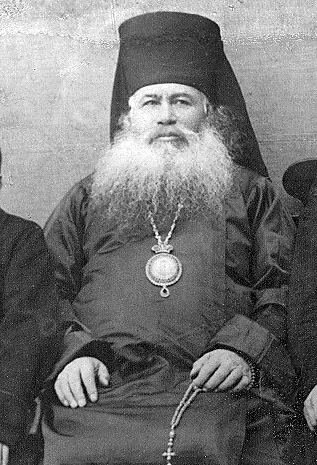Mar Elia Oraham

Did you know that in 1915, during the Assyrian Genocide, an Assyrian man who became a bishop in the Russian Orthodox Church, Mar Elia Oraham, hid from Ottoman forces on the roof of the American Mission in Urmia, Iran? Unfortunately, the Ottoman forces eventually found him, dragged him through the streets, and took him for ransom. They demanded 10,000 tomans for him, which was an exorbitant price at the time. Dr. William Ambrose Shedd, a Presbyterian missionary in Urmia, pleaded with the Persian and Ottoman authorities for his release, but to no avail. Even a group of Muslim citizens from Urmia petitioned for his release, stating that Mar Elia was a righteous man who had always treated them well. However, their pleas fell to deaf ears. Nevertheless, the Ottomans did finally release Mar Elia after receiving a payment of 5,000 tomans.
Mar Elia Oraham was born in the village of Armudaghaj in Urmia, Iran sometime between 1853 and 1858 (sources disagree on the date). His family came from a line of between 12 to 27 bishops (numbers vary depending on the source), with Mar Elia being the final one. One of Mar Elia’s relatives, Alexander Joseph Oraham, would eventually publish an Assyrian-English dictionary in Chicago in 1943, while his nephew, William Ibrahimi, would become the first Assyrian Representative in Iran’s Parliament in 1963.
During the nineteenth century, different Christian groups set up missions in Urmia, Iran, including the French Catholics, the Russian Orthodox, and the Presbyterian Americans. Therefore, through the influence of the Russian Orthodox missionaries, a group of Assyrians left their native Church of the East and joined the Russian Orthodox Church in the late nineteenth century. Among those converts was Mar Elia Oraham.
From 1894 to 1895, Mar Elia studied at the General Theological Seminary, an Episcopal seminary in New York City. Mar Elia’s brothers, Shmuel and Daniel, also left Urmia to study in the United States, however, they became medical doctors instead. After Mar Elia completed his studies in the United States, he continued his education in St. Petersburg, Russia. In 1899, he even translated a few poems by the renowned Russian poet, Alexander Pushkin, into Assyrian for a Russian book commemorating the centennial of the poet’s birth. You can read his translation of the poems here: https://babel.hathitrust.org/cgi/pt?id=hvd.32044085523058&view=1up&seq=702&skin=2021
In 1903, Mar Elia returned to Urmia and served as an assistant to Mar Yonan of Sopurghan, the head of the Russian Orthodox Church in the Urmia region at that time. Mar Elia replaced Mar Yonan in 1911 following the latter’s death. After World War I began in 1914, and the Russian troops left Iran at the end of that year, the Assyrians of Urmia experienced genocide from both Ottoman and Kurdish groups. That is why Mar Elia’s life was threatened in 1915, causing him to unsuccessfully hide from the Ottomans on the roof of the American Mission before being caught.
After Mar Elia’s release from the Ottomans, he fled to Moscow where he received the Order of Saint Vladimir, third degree in 1916. In 1917, he returned to Urmia, and by the end of that year, he, along with two other Assyrian clergymen, traveled to Tbilisi, Georgia to request aid for the devastated Assyrians of Urmia. The other two clergymen who accompanied him were the Reverend Isaac Malek Yonan, a Presbyterian minister, and Mar Toma Audo, the Chaldean Catholic Archbishop of Urmia and Salamas. Throughout the remainder of World War I, Mar Elia continued to assist Assyrian refugees to the best of his ability. Mar Elia passed away in November, 1918 and is buried at Mart Maryam Church in the city of Urmia.
Published by: Brian Banyamin
Written by Esther Lang
Bibliography
Cates, Patrick (Library Manager, General Theological Seminary). “Question about Alumnus.” Email Message to Esther Lang January 28, 2022.
Gevargiz, Hannibal. Ruhaniyan Barjasti-yi Ashuri Dar Do Gharneh Akhir [Eminent Assyrian Clergy during the Last Two Centuries]. Tehran: Assyrian Evangelical Church of Tehran, 2000.
Kulʹman, N. K. (Nikolaĭ Karlovich)., Sluchevskīĭ, K. K. (Konstantin Konstantinovich)., Mordovt︠s︡ev, D. L. (Daniil Lukich)., Gnedich, P. P. (Petr Petrovich). Pushkinskiĭ Sbornik: V Pami͡at’ Stoli͡etii͡a Dni͡a Rozhdenii͡a Poėta [Pushkin Collection: In Memory of the Centenary of the Poet’s Birth]. St. Peterburg: Tipografii͡a A.S. Suvorina, 1899. https://hdl.handle.net/2027/hvd.32044085523058 (accessed January 27, 2022).
Oraham, Alexander Joseph. Oraham’s Dictionary of the Stabilized and Enriched Assyrian Language and English. Chicago: Consolidated Press (Assyrian Press of America), 1943. https://archive.org/details/orahamsdictionar0000alex (accessed January 27, 2022).
Shed, Mary Lewis. The Measure of a Man: The Life of William Ambrose Shedd, Missionary to Persia. New York: George H. Doran, 1922. https://archive.org/details/measureofmanlife00shed (accessed January 27, 2022).
Woerl, Michael. “Abun Mar Elia (Abraham, d. November 1928) of Supurgansk and Urmia.” ROCOR Studies. March 25, 2015. https://www.rocorstudies.org/2015/05/17/abun-mar-elia-abraham-1858-1928-of-supurgansk-and-urmia-2/ (accessed January 27, 2022).
